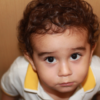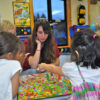Author Archive: Belgium - kleutergewijs.be

You don’t teach young children respect by making them feel ashamed
This blog post was contributed by Helena Taelman (ODISEE). Yusuf finds his teacher at the playground and angrily complains: ‘Miss, Amélie has taken my bike!’. Without giving it any thought the teacher reacts: ‘Snitching is not nice, Yusuf! We don’t do that!’ For good measure, she repeats her message for all the other preschoolers during…
Read more
“But daddy says I can!” About parenting and how to do it together
Parents, teachers, grandparents, … they are all involved in the education of a child. And they all have their own views and approaches. With the aim to aid and support all parties involved in raising a child together, we have developed a support tool, called the “pedagogical staircase”.
Read more
Young children growing up in diverse contexts primarily identify with their schools!
This blog post was contributed by Johan De Wilde (ODISEE). “We are the giraffes’ class, but miss Monique is the beavers’ teacher.” In this quote ‘we’ refers to a group of five-year-old kids in a pre-primary school in Belgium. The child explaining that miss Monique isn’t her teacher, but the teacher of the parallel…
Read more
Loose Parts Play and Developmentally Appropriate Practice
You have probably come across images of loose parts via social media groups and pages that boast wonderful pictures of intricate constructions and balanced mandalas, coined together with pretty loose parts. Loose parts are becoming popular elements in early childhood settings for a variety of reasons; one of them: to offer developmentally appropriate practice.
Read more
7 tips to make shared book reading even more beneficial for dual-language-learners
Preschool teachers are at their best during book reading activities, when it comes to posing challenging questions, and taking the discussion outside the here-and-now. We want our young dual-language-learners to share in these experiences and make them even more beneficial. I distilled 7 tips from her inspiring talk by researcher researcher Vibeke Grøver at the Equality & Inclusion conference in Utrecht in November 2019.
Read more
Do we ask too simple questions during shared book reading?
This blog post was contributed by Astrid Cornelis (Thomas More) Shared book reading reportedly promotes language proficiency, provided that the children are sufficiently challenged. The questions we ask play a crucial role in how much children will get engaged in the activity and learn from our reading aloud. Which makes us wonder if we indeed…
Read more
A horrid brat in class? The story of a 3-year-old child of parents with a mental illness
Once again Jip has hurt a child in the circle. For the third time in one week. While the teacher is reading aloud, Jip starts yelling, making it nearly impossible for the other children to follow the story. When teacher Jill tells the boy to stop shouting, he looks at her defiantly. “No, I won’t stop”, three-and-a-half-year-old Jip says in a self-assured way and he simply continues. In a mere couple of weeks, the toddler has turned into a badly-behaved child.
Read more
Innovations in ECEC do not always result in positive evidence. How should we deal with it?
This blog post was contributed by Helena Taelman (ODISEE). Educational professionals and researchers may build a nice innovation, grounded in the most recent insights of developmental and educational science. Nevertheless, it may not work as expected, since classrooms and schools are very complex realities (Willingham, 2012). I suspect this observation also applies to the field…
Read more
The power of structured games for children with behavioral problems
This blog post was contributed by Astrid Cornelis (Thomas More). Playing games together is simple, cheap and fun. Moreover, a recent study shows that children with behavioral problems benefit from playing games with their parents (Healey & Healey, 2019). Playing with their parents helps children with behavioral problems What if children with behavioral problems play…
Read more
Equal opportunities for boys and girls through play
This blog post was contributed by Eva Dierickx (AP). In general educators agree that an ideal preschool class offers every child the opportunity to develop optimally by providing an environment where they can improve their executive functions, establish healthy socio-emotional interactions, expand cognition, practice motor skills etc. in a playful way. The development of gender stereotypes…
Read more